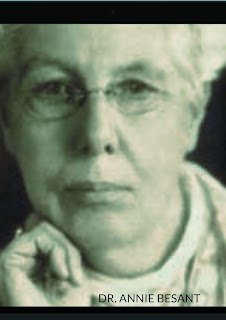Introduction & Early Life
Annie Besant was a well-known Theosophist, Social
reformer, Political figurehead, activist for women's issues, Author, and Public
Speaker. She was Irish by birth and considered India to be her second home. She
was the first woman to lead the Indian National Congress and worked for Indian
rights.
 |
| Annie Besant-Short Note |
On October 1, 1847, Annie Besant was born in London
to a middle-class family as Annie Wood. She had Irish ancestry. She was only
five when her father passed away. In order to support her family, Annie's mother
ran a boarding school for boys in Harrow. Her perspective was broadened by her
extensive travels throughout Europe. Annie was instilled with a strong feeling
of obligation toward society as well as an understanding of the potential of
autonomous women.
Besant's political and religious activities raised
concerns while she was a student at the Birkbeck Literary and Scientific Institution. in 1867 When she was 19 years old, she married Frank Besant.
The couple had two children but eventually separated due to a religious
difference. The Bloody Sunday rally and the London matchgirls strike of 1888
were two subsequent union activities in which Besant became active. She was a
prominent speaker for both the Marxist Social Democratic Federation and the
Fabian Society (SDF).
Theosophist, Social activist, and Political Leader
In 1890, she met Helena Blavatsky and developed an
interest in Theosophy. She later joined the Society and had success as a
Theosophical lecturer. She later became known as a writer and speaker for the
National Secular Society (NSS) and Charles Bradlaugh's close friend. The
following years revealed Annie's amazing Abilities and Vigour. She Authored
numerous pamphlets and publications on progressive subjects and served as the
founding secretary of the Malthusian League, an organisation (the Family
Planning Association). The Law of Population, her own birth control brochure,
sold 175,000 copies.
After Col. H. S. Olcott passed away in 1907, Annie
Besant was elected to the position of second International President of the
Theosophical Society, while engaged in Theosophical study, In the course of her
Theosophical activity, Mrs. Besant visited practically every country in Europe
more than once, and she also made numerous trips to the United States, Canada,
Australia, and New Zealand. Her excellent organisational skills were put to use
to "make theosophy realistic," and taking action became her "Tagline."
Once She visited India. She travelled the whole of India. It provided her
knowledge of India and middle-class Indians who were more impacted by British
rule and its Educational system. She joined the Indian freedom movement as
well. Besant founded a new boys' school in Banaras called the Central Hindu
College (CHC), which had many eminent theosophists on its faculty and staff and
was founded on fundamental theosophical principles. Its goal was to create new
Indian leadership. The pupils studied modern science in addition to studying
religious scriptures for 90 minutes each day. After some time, she was able to
start additional lodges across the British Empire.
Besant also got active in politics in India. She
participated in the founding of the Home Rule League, an organisation that
fought for Indian democracy and dominion status inside the British Empire, when
World War I started out in 1914. She was elected President of the Theosophical
Society in the year 1907. As a result of her involvement in Indian politics,
she quickly joined the Indian National Congress. In 1917, she was elected
president of the Indian National Congress. It was the first time a woman held
that position. She started "New India," a newspaper that questioned
British control, and she was imprisoned for rebellion. Differences between
Mahatma Gandhi and Annie Besant developed once Gandhiji entered the Indian National
arena. She gradually stopped participating in politics .
Besant became ill in 1931 and passed away at the age of 85 in Adyar, Madras Presidency, on September 20, 1933. On October 1, 1963, the Indian Government also released a postage stamp in her honour, a neighbourhood in Chennai close to the Theosophical Society is called Besant Nagar. numerous streets are named after her.








0 Comments